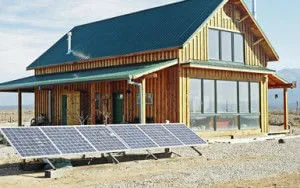With instability in both the economy and the political arena more and more people are seeking a sustainable lifestyle. One aspect of being completely sustainable is cutting the cord between yourself and the centralized utility system.
An off the grid lifestyle is one that is eco friendly, cost effective, and healthy. It means you do not rely on the grid (centralized utility system) to sustain you, you simply sustain yourself. Many people who live off the grid live in owner-built green homes in rural areas. However, an off the grid home can be any style, and be in any location.
Some homes are transformed school buses or a tiny home on wheels that have no permanent location, while others are large earth homes, or log cabins in the desert or on a mountainside. Living off the grid means you are not connected to water, electric, gas, or are relying on outside sources to function. These homes are sustainable and go hand in hand with green living, and getting back in touch with nature.
Why should I live of the grid?
- You will save tons of money.
- You will free yourself from the control of the grid.
- If something goes wrong you will be fine. Imagine if something happens and the water no longers runs, or the electric grid goes out. You will still have all the conveniences you need, while others will be helpless.
- Living off the grid is better for the environment.
- You can simplify your life. Instead of working so you can afford oil to heat your home, you can spend the afternoon chopping free firewood from your property.
- Living off the grid forces you to work, use your brain, stay fit, and be active.
- Kids living off the grid will learn very important life skills that others in their generation won’t have.
- You reduce your carbon footprint.
- Living off the grid sets an example for others to do more with less and treat the environment with respect.
Things to consider when thinking about living off the grid:
- You will need some upfront cash. Moving, building a home, setting up an electric and water system all take a little money up front. However, it will save you lots of money in the long run.
- Don’t expect it to be simple and easy at first. Purchasing the right land, acquiring building permits, and setting up water systems can all take time and lots of energy. Don’t expect this change to be quick and easy, expect some downfalls and bumps.
- Living off of the grid is not the same as living on the grid. You will have to leave some comforts behind and learn to appreciate the simpler things.
- If you’re sold on the idea, but your family is not, it probably is not best for you. One person loving life, and the others hating it is not a healthy way to live.
- Don’t expect to set up your homestead and everything run smoothly, your home and land will need work to be kept up and in proper working order.
- People moving of the grid are sometimes looked down at because of their choices to live simpler, less complicated lives. Don’t expect your friends and acquaintances to jump on the boat right away and think it is a great idea. Just remember your goals, and stand for what you know is right for you.
Steps to living off of the grid:
Research – Get as many books, ebooks, and magazines as you can on living off the grid, home gardening, home building etc. Start following some blogs about people who have made similar transitions and learn as much as you can. If possible, meet some people who are living off the grid and ask tons of questions.
Purchase – If you are not allowed to live off of the grid in your current home, then it’s time to move. You can look for land with an off the grid home or cabin already built, or build one yourself. Off the grid homes can be as elaborate as a traditional urban home, or as simple as a canvas wall tent. Recycled shipping containers, mud homes, yurts, tiny houses, underground homes, earthbag homes, straw bale homes, log cabins, transformed vans and school buses, tree houses, and houseboats are all good examples of suitable off the grid homes. The land you purchase does not have to be big.
If you plan on growing your own food, 1/2 an acre can easily feed a family if farmed properly. If you want to raise some livestock or simply want some open space, a little more land may be suitable. Make sure to pick land that will suit your needs. Don’t get a rocky timber covered lot if you want to grow vegetables.

The more complex however, the more money it will cost, but the easier your lifestyle will be. You will also need to think about heating and cooling your home, a refrigeration system, and if you want appliances.
Live – Set up a garden, feed your family, chop firewood, live simply. Don’t make it complicated, just live.
“Make a mental commitment first and work to make it happen”
-The Alternative Daily
